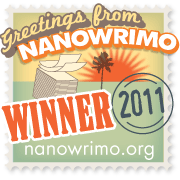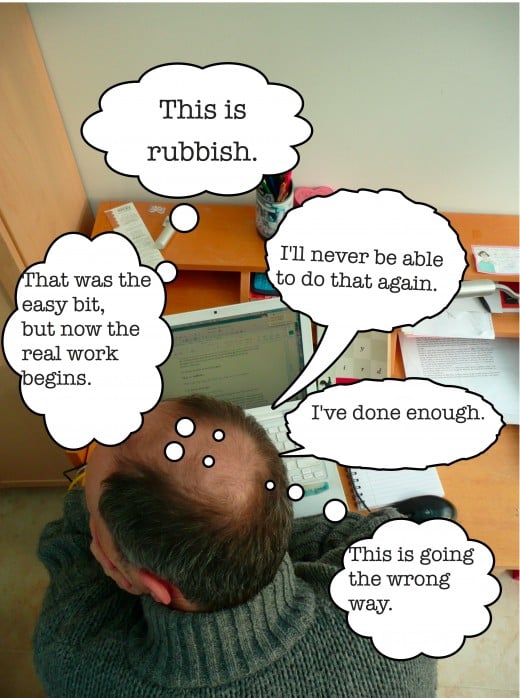Overcoming Writer’s Block with NaNoWriMo
What is NaNoWriMo?
Just in case you haven’t heard of it, NaNoWriMo stands for National Novel Writing Month. It’s something of a misnomer, since it has been international rather than national for most of its history. While the event began in the USA in 1999, by the following year, which was the first that NaNo (as those of us who have taken part affectionately call it) was online, there was already someone from Canada taking part.

What’s the point in NaNo?
I first read about NaNo several years ago on a blog I used to follow. I couldn’t see the point in it. The idea of writing a novel in a month seemed utterly crazy to me at the time, and as far as I could see any novel written that quickly would be dross. I didn’t give it a second thought.
Then three years ago my older daughter, then aged ten, decided she wanted to join a friend who was taking part in NaNoWriMo’s Young Writers Program. Children can choose their own word length; my daughter had wild ambitions to write a 20,000 novel. She didn’t come close, so the following year when she decided to try again I persuaded her to aim lower. She settled on 15,000 words, and had the ambitious plan to write a story set in the 18th century during the Seven Years’ War between the UK and France. Although she’d done some research beforehand, she was soon struggling with her story and was way behind the word count. One Sunday afternoon in mid-November, she lay on the floor wailing that she would never be able to do it.
I knew how she felt. Several years before, when I was in the middle of a Creative Writing MA, my second daughter was born extremely premature. I was granted an intermission, and for about eight months even didn’t try to write. When I started back, my confidence was low and my writing took place in snatched moments while the baby slept. I didn’t have time to hang about waiting for the muse and with a fierce inner critic to get round, I developed a way of writing down whatever came into my head, even if it was: “This is total rubbish and you will never write anything good.” This got the thoughts out of my head and took away some of their power.
Two Books That Help Overcome Writer’s Block

I also used a method Natalie Goldberg suggests, in Writing Down The Bones, of rewriting each chapter several times, without looking at previous versions. I did that in longhand, before selecting the sections that worked and transferring them onto my computer. It meant that much of what I wrote wasn’t used, but it provided the energy I needed to keep going.
Asking a panicking eleven year old to rewrite each chapter several times wasn’t likely to calm her, so I didn’t! But I did suggest she try writing whatever came into her head, and I did read her an edited version of the third chapter of Anne Lamott’s book Bird by Bird. This chapter is titled “Shitty First Drafts,” and gives you permission to start writing without worrying about the quality.
So NaNoWriMo does have a point after all…
This is exactly the point of NaNoWirMo, which I somehow managed to miss all those years ago. In the “About” section on the NaNoWriMo website, is this wonderful piece of information:
Make no mistake: You will be writing a lot of crap.
Instead of spending years trying to produce the perfect piece of literary fiction and feeling blocked, you give yourself permission to make mistakes. The intention was never to produce a finished novel at all, but to produce a first draft. (At a word count of 50,000 words, this is a very short first draft, since most novels fall somewhere between 60,000 – 100,000 words.)
My daughter completed her 15,000 words that year, and last year decided to go for 25,000. She also persuaded me I sign up. I wasn’t convinced, but decided it might be an opportunity to kick-start my second novel, even if I didn’t get close to 50,000 words.
Given that the NaNoWriMo methods work so well for me, it now seems strange that it took me so long to come round. But until November 19th 2010 I believed that I was a slow writer. By then I had just about given up hope of reaching the target word count, since my daughter had been ill much of the month and I’d done very little writing. That morning I woke early and started writing before anyone else was up, and in fifteen minutes I wrote four hundred words. Suddenly I was no longer a slow writer. I had also written straight onto the computer, rather than longhand, something I didn’t think I could.
I use The Work of Byron Katie, a process that involves noticing stressful thoughts and questioning them, so I wondered what else I believed about my writing ability that wasn’t true. I started paying more attention to the thoughts that came to me every time the writing flow dried up.
Some Thoughts That Can Cause Writer’s Block

Those thoughts were all mine, but from working with others I know they are pretty universal. The first two of those thoughts didn’t surprise me. The next two did.
Let’s take a closer look:
“That was the easy bit, but now the real work begins.”
Does that sound familiar at all? The sort of thing teachers, parents and other adults might say to encourage a reluctant child to keep going on some task? Could it have been something I had absorbed as a child to try and motivate myself? I actually felt grateful for all the effort my mind had made to try and keep going – and I could see that the tactic wasn’t working, and it was time to let it go.
I’ve noticed most negative thoughts of this sort are rooted in kindness, in trying to protect ourselves and others from hurt. For instance parents may try to protect children from disappointment by discouraging them from unrealistically high expectations, but the result can be unrealistically low expectations.
“I’ve done enough,” is the obvious retort of the reluctant child who doesn’t want to try the harder task. I was truly surprised to realize it appeared in my mind almost every time I stopped writing. It was accompanied by a number of excuses. “It’s too hard.” “I’m too tired.” “I’m never going to finish in time anyway so what’s the point?” “This is just indulgent anyway, I don’t need to do NaNoWriMo, I should be doing the cooking/cleaning/painting my fingernails.” (Actually I haven’t painted my fingernails since 1980, but you get the picture.)
The rest of November last year was for me a continuing lesson in how to let go of writer’s block. As well as believing I was a slow writer and had to start longhand, I used to believe I needed quiet to work. The heaviest snowfall our city had seen in forty years began on the 28th and the schools were shut for the next few days. The room I work in is directly off our living room, and on the last day, with the television blaring and kids talking, I wrote words straight onto the computer. The story kept veering off in directions I didn’t expect, but that turned out to be what it needed. I wrote almost 10,000 that day, completing somewhere over 40,000 in all. So while I didn’t make the amount needed to count as a NaNoWriMo winner, I felt like a winner.
The Work of Byron Katie in Action
BELIEF:
The writing should flow.
Is it true?
I can't know that, no.
How do you react when you think that thought?
I feel frustrated, anxious when it doesn't. Get distracted. Tell myself if it's any good, if I'm doing it right, the writing should flow.
When it doesn't flow I stop, write emails, do inquiries, read forums, hubs, my hub statistics. Lie on the sofa feeling tired. Try to force myself to write and then notice and let go. Imagine I will never get it done in time, that I can't do it.
Who would you be without the thought?
More willing to stay with it when it doesn't flow, to just write anyway. I'd trust my process, remember that with my first novel I wrote reams longhand that never even made it onto the computer, whereas with this novel everything has been straight onto the computer so all my ramblings are there. I’d remember it takes getting the dross out first to get to the gold.
So without the thought I'd be more patient with my process, relax, enjoy.
The Turnaround – and three reasons it is true.
The writing shouldn't flow.
1) Because this is reality, if it doesn't.
2) Because then I get to see my muddled beliefs, the subtle pressure I exert on myself that stops the flow
3) Because when I'm thinking "it should flow," or "I need to get a move on" or any similar thoughts - how on earth can it flow? I'm not engaged with it, I'm trying to control, get approval etc.
That last one, in particular, feels so freeing. Peaceful.
Overcoming Writer’s block NaNoWriMo Way
I have no doubt that my first NaNo experience has helped me enormously when it comes to writing on Hubpages. I may not even have signed up if I hadn’t taken that first challenge. Having taken the plunge and overcome several limiting beliefs, I could do it again.
However, although I was initially pleased with the plot deviations that had arisen, a character that was not in my original plan had appeared out of nowhere and taken on the role of “supporting actress”, which I had originally designated to another character. I thought I needed to bring the first character back into the forefront and couldn’t see how. I felt stuck.
November 2011 approached. I decided to have another go at NaNo, to see if this time I could complete it, and more importantly to see if I could get that novel moving on again.
November became crowded: Hubpages ran its Creative Writing contest, I had a seminar booked for the last weekend and citation for jury service for the last two days. And my daughter was sick again!
I devoted the first part of the month to Hubpages and on the 12th got down to NaNoing. I kept a journal beside the computer so that every time I felt blocked I could write down the thoughts that brought me to a halt. I welcomed whatever thoughts and feelings came up and allowed them to pass. The thoughts were usually variations of, “I’ll never be able to do it,” or, “I shouldn’t think it’s that easy.”
I also noticed that I felt rushed and forced much of the time. I just caught up with the target daily word count before my weekend away, so upon my return I was behind again. Luckily, at the last minute, I wasn’t required for jury service, but I felt very tired and struggled to keep up. Then I noticed I had a belief that if the writing was any good it should flow. I used the Work of Byron Katie to look question that belief. The result of that inquiry is in the box on the right, with the process’s questions in bold. The realizations I gained from that process helped me to feel more relaxed, but I still felt tired and a little ill.
On the very last morning, feeling rushed, I realized I had a persistent image in my mind of struggle and of pushing myself to work. With that realization, I let go of the stress I’d felt. I still felt tired, but it no longer felt overwhelming, and the rushed feeling I’d had all month dissolved. I reached 50,129 words with around three hours to spare, and more importantly I got beyond several writing blocks that have plagued me for years. My novel has taken several unexpected twists that I’m now very happy with as details slot together well. The most important lesson for me is a reminder that if I trust the writing process it will give me what I need. The first draft of my novel is not yet finished, and there’s rewriting yet to come. But taking part in NaNoWriMo has been an amazing and enjoyable experience. I thoroughly recommend it, especially if you believe you are slow at writing!
Discover The Work of Byron Katie on Amazon
More about NaNoWriMo
It began in July 1999 in the San Francisco with twenty-one writers.
In 2010 over 200,000 people took part with around 30,000 completing challenge.
NaNoWriMo is financed by donations from participants and by sponsorship from companies such as Amazon, Create Space and Scrivener.
There are many local groups were people write together.
Both the adult and children’s program have active forums where writers can support each other. I have never used the forums, but my daughter regularly does, writing plays with other young writers throughout the year.
If you can’t take part in November, you can join the April Script Frenzy or Camp NaNoWriMo, which takes place in June and in August.
In January agents are swamped with unedited NaNoWriMo novels. If you decide to take part, do remember what you have at the end is a first draft. Remember even the NaNoWriMo site says:
Make no mistake: You will be writing a lot of crap.
Enjoy!









